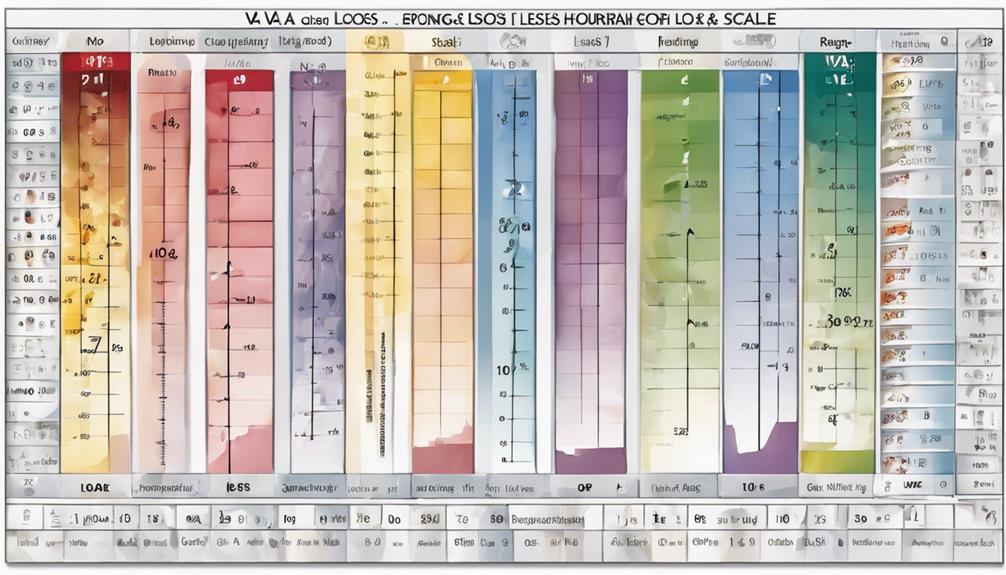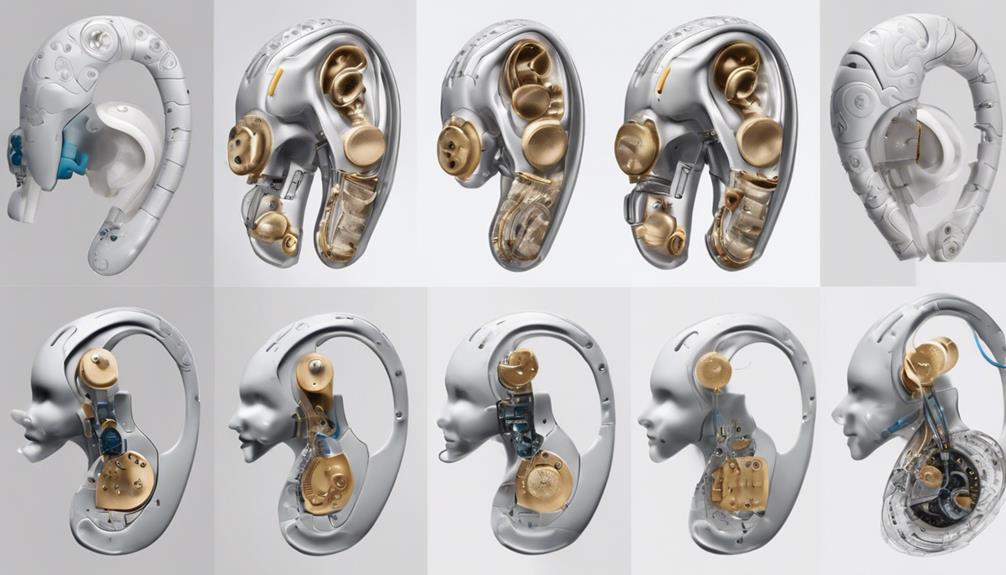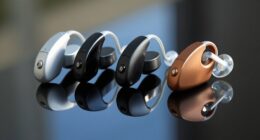Have you ever wondered how cochlear implants function when there is magnetic interference?
The interaction between these devices and magnetic fields is a topic that raises questions about their reliability and effectiveness.
Understanding the intricacies of this relationship can shed light on the measures needed to ensure optimal performance and safety.
Let's explore the complexities of how cochlear implants navigate magnetic interference to provide individuals with hearing loss the gift of sound seamlessly.
Key Takeaways
- Cochlear implants can be disrupted by external magnetic sources.
- Proper positioning and microphone placement enhance resilience to interference.
- Magnetic fields near the transmission link may not consistently disrupt pulses.
- Understanding magnetic interference effects is crucial for optimal implant performance.
Understanding Cochlear Implant Technology
Cochlear implant technology integrates internal and external components, including a receiver, electrodes, a processor, a microphone, and a transmitter, to facilitate sound perception for individuals with hearing loss. The receiver, implanted under the skin behind the ear, picks up signals from the external components, converting them into electrical impulses that stimulate the auditory nerve. The electrodes, placed within the cochlea, transmit these impulses to the brain, allowing for sound perception. The processor, worn externally, processes sound signals and transmits them to the transmitter, which then sends them to the receiver using radiofrequencies.
Understanding the intricate workings of cochlear implants is crucial for optimizing their functionality. While these devices are adept at providing auditory input, precautions must be taken to avoid magnetic interference. Placing static magnets near the implant, for instance, can disrupt its operation. Furthermore, exposure to electromagnetic fields, such as those generated by certain medical procedures, should be minimized to prevent potential damage to the implant. By comprehending the nuances of cochlear implant technology, we can ensure better outcomes for individuals with hearing loss.
Impact of Magnetic Interference on Implants

Given the intricate workings of cochlear implant technology and the importance of understanding magnetic interference, it's paramount to delve into the impact of such interference on the implants' functionality.
- Magnetic interference from external sources like magnetic trackers or devices with strong magnets can disrupt cochlear implants.
- This interference may lead to unwanted distortion in the signals processed by the implant, affecting the user's hearing experience.
- Proper placement of the microphone within the cochlear implant system has been shown to improve resilience against magnetic interference.
- Magnetic fields from markers or external devices near the transmission link of cochlear implants mightn't consistently disrupt the pulses received at the implant electrode.
Understanding the effects of magnetic interference is crucial for maintaining the optimal performance and functionality of cochlear implants in various environments. By considering electromagnetic compatibility (EMC) and taking measures to minimize exposure to strong magnetic fields, individuals with cochlear implants can ensure the devices continue to provide clear and reliable sound signals for improved communication and quality of life.
Risks Associated With Magnetic Fields
In considering the potential risks associated with magnetic fields, it's crucial for healthcare providers to be vigilant and proactive in managing interactions between hearing implants and programmable CSF shunt systems. The presence of magnets in hearing implants poses a significant risk of interference with CSF shunt systems, potentially leading to unintended changes in shunt valve settings.
Such interactions can result in over- or under-drainage of cerebrospinal fluid, manifesting as symptoms like altered mental status and headaches. If left untreated, cases of magnetic interference between hearing implants and CSF shunts can escalate to severe outcomes such as seizures, hemorrhage, or even death.
To address these risks effectively, healthcare providers must educate patients about the dangers of magnetic fields, verify shunt valve settings post-device placement, and carefully consider the placement of medical devices in relation to the shunt valve. Trained clinicians should be ready to adjust shunt valve settings to ensure electromagnetic compatibility (EMC) and mitigate risks associated with magnetic interference between hearing implants and CSF shunt systems.
Managing and Mitigating Interference

To ensure optimal functionality and safety of medical devices, meticulous attention must be given to managing and mitigating potential magnetic interference between hearing implants and programmable CSF shunt systems. When dealing with cochlear implant systems, especially their susceptibility to magnetic interference, the following strategies are crucial:
- Proper Positioning: Ensuring the correct placement of the implant components can help reduce the impact of magnetic fields on the system.
- Microphone Placement: Specific placement of the microphone within the cochlear implant system plays a significant role in minimizing vulnerability to magnetic interference.
- Avoiding Static Magnets: Guidelines recommend steering clear of static magnets near cochlear implants to prevent disruptions in their functionality.
- Protecting Transmission Link: Properly positioning the transmission link and avoiding magnetic fields near it are essential steps to safeguard the integrity of the implant electrode signals.
Safety Measures for Cochlear Implant Users
Safety measures for cochlear implant users encompass various protocols and guidelines to ensure the optimal functionality and longevity of the implant system in the presence of potential magnetic interference.
The British Cochlear Implant Group advises against placing static magnets near cochlear implants to prevent interference. It's crucial to avoid injecting currents in the head to protect cochlear implants from damage due to magnetic interference.
While electromagnetic fields (EMFs) don't pose direct risks to cochlear implants, they may introduce noise through the implant. Adhering to safety guidelines from the British Cochlear Implant Group can help maintain the proper functioning of cochlear implants in the presence of magnetic interference.
Additionally, placing a magnetic position tracker near the transmission link of a cochlear implant system shouldn't disrupt pulses at the implant electrode, thereby preserving functionality.
Frequently Asked Questions
Can Magnets Affect Cochlear Implants?
Yes, magnets can affect cochlear implants. The presence of magnets near these devices, which have internal static magnets and radiofrequency transmitters, can lead to interference.
While direct risks to the implants may be minimal, interference can introduce noise into the system. It's crucial to maintain a safe distance between static magnets and cochlear implants to ensure proper functionality and prevent potential disruptions.
What Is the Function of the Magnet in the Cochlear Implant?
The magnet in a cochlear implant system serves to secure the external sound processor in place on the head. It enables easy attachment and removal of the processor for daily use and maintenance.
This crucial component aids in transmitting sound signals from the external processor to the internal implant parts. Its design ensures proper alignment and function of the system, preventing displacement during regular activities.
The magnet plays a vital role in the overall functionality of the cochlear implant.
What Interferes With Cochlear Implants?
We've found that various factors can interfere with cochlear implants, affecting their proper functioning. These may include static magnets, injected currents in the head, and external components like transmitters and processors being impacted by magnetic fields.
While electromagnetic fields themselves may not directly harm the implants, they can lead to unwanted noise within the device. Adhering to guidelines for avoiding magnetic interference is essential for maintaining the effectiveness of cochlear implants.
What Happens if Someone With a Cochlear Implant Gets an Mri?
When someone with a cochlear implant undergoes an MRI, precautions must be taken to ensure their safety. Following the manufacturer's guidelines is crucial to minimize risks of magnetic interference.
Healthcare providers and technologists should be informed about the implant beforehand. Specific MRI conditions may need adjustments for safety.
In some cases, a specialized 'MRI Conditional' protocol is utilized to ensure safe imaging for individuals with cochlear implants.
Conclusion
In conclusion, it's crucial for cochlear implant users to be aware of the potential impact of magnetic interference on their devices. By following safety measures and managing interference effectively, we can ensure the proper functioning of cochlear implants.
Remember, prevention is key when it comes to protecting this life-changing technology. Stay informed, stay vigilant, and enjoy the benefits of improved hearing without disruption.










